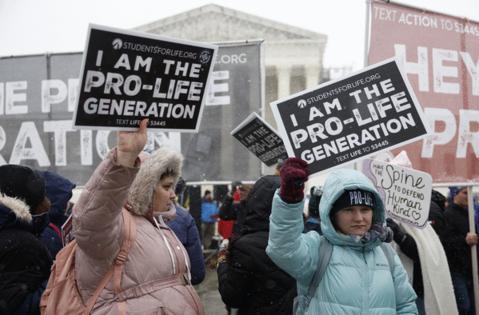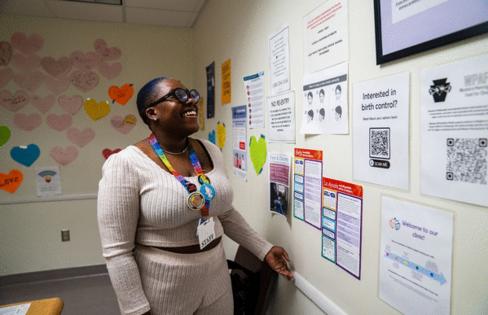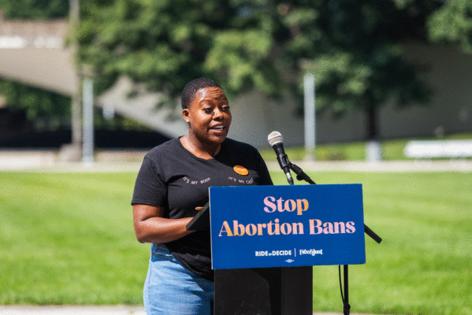Will Pa. voters and reproductive rights decide the election?
Published in Political News
PITTSBURGH — Reproductive rights were thrust to the forefront of many voters' minds following the U.S. Supreme Court's 2022 repeal of Roe v. Wade, a decision that triggered a patchwork of abortion access across the country. This November, the issue is on the ballot in 10 states.
As Election Day nears, the degree to which such concerns will propel voters to the polls remains unclear. "It's a bit of a sleeping bear," said Debbie Walsh, director of the Center for American Women and Politics at Rutgers University Eagleton Institute of Politics. "Post-Dobbs, we've poked the bear."
For many, the notion that access to abortion, contraception and IVF treatments could be further restricted, she said, "is powerful." Those who want more restrictions on such procedures could be energized, too.
So how likely is it that this issue will determine the outcome of the presidential election — especially in a swing state like Pennsylvania?
Experts say that's tough to predict, but it's certainly a mobilizing force no matter party affiliation. And for those who aren't yet planning to vote, a parallel track runs alongside: fighting voter apathy.
How do Americans feel about abortion?
Two years after the Supreme Court's decision in Dobbs v. Jackson Women's Health Organization, with abortion protections deemed to be outside the scope of the Constitution, polls regularly show a majority of citizens supporting protections for some access to the procedure.
A September Kaiser Family Foundation (KFF) health tracking poll of 1,300 U.S. adults found 61% expect this year's presidential election to have a major impact on abortion access, including 58% of Independents and 41% of Republicans. Six in 10 voters said they prefer national abortion protections as opposed to leaving it up to the states.
Support is higher among Democrats, with 90% of Democratic women voters ages 18 to 49 saying abortion rights will be a key factor in this election. That's up from 59% in a March KFF poll.
A Pew Research Center poll from May, surveying nearly 9,000 U.S. adults, found 63% of those polled want abortion to be legal at least in some cases. This percentage includes bipartisan support.
"There's been a ton of polling showing that abortion rights have never been more popular," said Greer Donley, associate professor of law at the University of Pittsburgh School of Law, who specializes in abortion issues.
That's not a universal stance, of course.
For example, the Catholic Diocese of Pittsburgh has lauded the repeal of Dobbs, and its bishops have stated they oppose the procedure. The diocese represents more than 600,000 Catholics across Allegheny, Beaver, Washington, Butler, Greene and Lawrence counties, according to its website.
Will it get people out on Election Day?
While Pennsylvania doesn't have a ballot measure on abortion this cycle, it is the battleground state with the most electoral votes — 19 — and holds sway in the presidential election.
"Abortion might be the biggest issue in this election," said Donley. "It may bring people who might sometimes sit out of the polls. I expect that to be at play especially in a state like Pennsylvania."
Post-Dobbs, state measures supporting reproductive rights have passed each time they've been posed, including in traditionally conservative states like Kansas and Ohio. Voters have also struck down bills, as in Montana and Kentucky, that would have amended their state constitutions to not guarantee the right to abortion. (The procedure remains illegal in Kentucky.)
The measures on the ballot this season — 11 total across 10 states, with two in Nebraska — represent the most ever recorded for a single year, according to Ballotpedia. The number of measures, mostly citizen-led, per KFF tracking, is an important sign that people are engaged, said Diana Mutz, professor of political science and communication at the University of Pennsylvania.
That voters in states considering abortion- or other reproductive-related measures may turn out at higher rates than states where the issues are not on the ballot makes sense, said Nichole Bauer, associate professor of politics and communication at Louisiana State University, who specializes in gender and politics.
A study on voting in the 2022 Congressional races, conducted by Mutz and her Penn colleague Edward Mansfield, director of the Center for International Politics, found the issue of abortion swung voting more in that election than concerns about the economy.
"We find strong evidence that views on abortion were central to shifting votes in the midterm elections," the pair said in the paper. Many of those shifts were changes in votes toward the Democratic candidate for the sole purpose of protecting reproductive rights, said Mutz.
Whether that pattern continues into the 2024 election remains to be seen.
'Pregnancy just got a lot scarier'
A potential key demographic this election: moderate women who consistently vote to protect abortion access, and who have been paying attention to the high-profile stories of those impacted by restrictive laws.
"This is a group of women that often votes Republican but is not jazzed up about Trump," said Bauer. "It could be a really decisive group of voters."
They might respond to stories like that of Kate Cox, the 31-year-old who sued the state of Texas last year after being denied an abortion under its new law. Cox, who already had two children, was told by her doctors around her 18th week of pregnancy that her baby had Trisomy 18, a genetic condition that is almost always fatal. Carrying the baby to term also risked putting her own health in jeopardy, said doctors. She traveled out of state for the abortion.
"Nobody ever expects pregnancy complications to happen, but they're realizing it can happen to anybody," Bauer said. "Just because you're pro-life doesn't mean you're exempt from these complications."
Anti-abortion groups may be just as motivated to vote against candidates who want to protect the procedure.
The Pennsylvania March for Life rally, which took place at the Capitol Building in Harrisburg in late September, brought out between 6,000 and 7,000 attendees, according to the organization's president, Jeanne Mancini. She said the number was higher than at previous rallies.
"Based on the thousands of pro-lifers who turned out for the Pennsylvania March for Life last month, and the fact that most Americans oppose unlimited late-term abortion that is taxpayer funded, we are hopeful that PA voters will vote for life this election," said Mancini in an email.
"Now more than ever it is crucial that we protect both women and the unborn."
What's at stake?
Vice President Kamala Harris has campaigned heavily on protecting abortion rights. Former President Donald Trump has been less clear on his policies, though he has said he will leave access up to state discretion. His VP candidate, Ohio U.S. Sen. JD Vance, spoke more broadly about "pro-family" support during his debate with Democratic opponent Minnesota Gov. Tim Walz.
"The Harris campaign is using this issue as a mobilizing and decisive issue, whereas Republicans don't have a clear or consistent position," said Bauer.
That may be because while it's a top issue for Democrats, Republicans are prioritizing other concerns, like immigration.
In the KFF survey, the number of registered Democrats who believe the presidential election will highly impact abortion access increased from 71% to 84% over four months. For their Republican counterparts, the number increased from 40% to 41%.
Donley, at Pitt's law school, said she expects if Trump wins the presidential election, he will sign a national abortion ban.
"The presidential election has an enormous impact on every person's reproductive rights," she said. "It doesn't matter if you're in a state like New York where abortion is protected. They could ban telehealth [prescribing of abortion pills], and that would impact everyone."
When Roe v. Wade was overturned, Justice Clarence Thomas, in a concurring opinion, said the Supreme Court decision opened the door for the restriction of similar reproductive policies such as widespread access to birth control.
IVF entered the spotlight as well, when Alabama's Supreme Court in February ruled that frozen embryos were considered to be children. An April Pew Research Center poll found that 8% of Americans surveyed opposed in vitro fertilization, while 70% support the procedure.
"All of this is suddenly on the table again in a way that people just didn't think was possible," said Walsh.
If Harris wins, she might not be able to recodify Roe v. Wade. The Senate has the potential to flip from Democratic to Republican control, potentially stymying any efforts to reinstate national protections, while the House is currently in a Republican majority and could flip to Democratic.
The issue of young-voter apathy
Whether the issue so energizing to many older voters generates enough impetus to get young people to the polls isn't clear.
Some research shows that, as in past elections, they're the group of voters least likely to turn out on Election Day. On the Slippery Rock University campus, in Butler County, there's evidence of voter apathy creeping in among students.
"Broadly on campus, a lot of people are checked out," said Liam Bull, a 21-year-old education student from Beaver County, and vice president of the Feminist Majority Leadership Alliance, a campus club that holds discussions and events related to equity and gender issues. "Generally, it's the women that are taking this more seriously."
Club president Sasha Jantsch, 21, of Zelienople, who studies gender and diversity, said she's heard from many people that they're not planning to vote at all. Some might not like Trump, but don't approve of Harris' stance on the war in Gaza, for example.
"They're searching for the perfect candidate," she said. "We have a whole demographic that hasn't been harnessing their voices."
Multiple requests for comment from religious and faith-leaning groups on area college campuses, such as Divine Ministries, a women's faith group at Slippery Rock, and the Pre-Health Care Career Club at Geneva College in Beaver County, which is affiliated with the Reformed Presbyterian Church of North America, were not returned.
Meanwhile, many young people are frightened by the potential outcome of November's election, and some don't hesitate to offer apocalyptic metaphors.
Bull offered that the level of polarization among U.S. voters feels akin to the tension just before a war, while Jantsch said the potential for more restriction of reproductive rights calls to mind Margaret Atwood's book "The Handmaid's Tale," a dystopian story in which a patriarchal society leaves women powerless.
©2024 PG Publishing Co. Visit at post-gazette.com. Distributed by Tribune Content Agency, LLC.

































































Comments